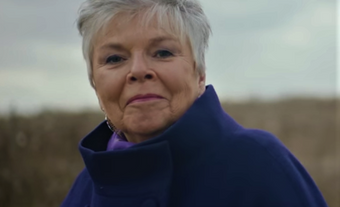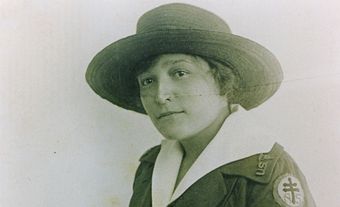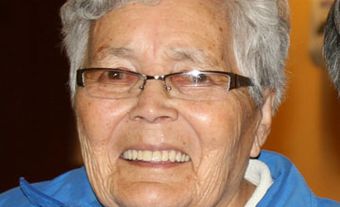Marion Meadmore (née Ironquill), OC, Ojibwe-Cree, one of the first Indigenous female lawyers in Canada, newspaper editor, community activist, founder and co-founder of national and Prairie Indigenous organizations (born in 1936 on the Peepeekisis reserve near Balcarres, SK.) She helped create the National Indian Council and co-founded the National Indigenous Council of Elders and the Indigenous Bar Association of Canada.

Early Life and Education
Marion Ironquill was born to a Cree mother (Helen) and Ojibwe father (Joseph). She grew up on her family’s farm in Saskatchewan. Her father, a chief, was known to invite struggling neighbours to stay with them until their situation improved. From him, Ironquill learned: “We’re here to look after people.”
Ironquill spent 10 years at residential school, graduating from Birtle Collegiate Institute in Manitoba. At age 16, she enrolled in pre-med courses at the University of Manitoba in Winnipeg.
Ironquill left school in 1954 to marry Ron Meadmore, who became a Winnipeg Blue Bombers lineman in the Canadian Football League. Their marriage lasted until Ron’s death in 2013.
She raised their three boys for almost 20 years before returning to the University of Manitoba to get a law degree.
Community and Political Work
Indian and Métis Friendship Centre
Marion Meadmore helped establish the Indian and Métis Friendship Centre in 1959 as a gathering place for urban Indigenous people around Winnipeg. The first of its kind in Canada, the centre became a model for others across the country. (See also Friendship Centres.)
The centre’s newspaper, The Prairie Call, launched in 1961 and featured Indigenous writings and events. As editor, Meadmore used the paper to discuss human rights issues and the realities of urban life, to build community and address Indigenous peoples’ legal and socio-economic challenges.
This Secret Life of Canada episode explains the history of Friendship Centres, an essential part of urban Indigenous life across the country.
Note: The Secret Life of Canada is hosted and written by Falen Johnson and Leah Simone Bowen and is a CBC original podcast independent of The Canadian Encyclopedia.
National Indian Council
With five others, Meadmore formed a committee in 1954 that became the National Indian Council (NIC) in 1961. This council was an important forerunner in national Indigenous political organization. Meadmore was elected secretary treasurer of NIC in 1962. When the council closed in 1967, it split into two associations — the National Indian Brotherhood (which went on to become the Assembly of First Nations in 1982) and the Native Council of Canada (which became the Congress of Aboriginal Peoples in 1993).
Work in Housing
Meadmore was appointed to the National Council of Welfare in 1970. That year, she co-founded the non-profit Kinew Housing. Sponsored by the Indian and Métis Friendship Centre, the organization advocated for a social housing policy and sought cooperation between private funders and the government body, Canada Mortgage and Housing Corporation. The non-profit bought older houses at favourable prices in safe neighbourhoods close to good schools. Indigenous workers renovated the homes that Kinew then offered to Indigenous peoples at reasonable rates.
Meadmore’s work with Kinew partly influenced her return to school to pursue law. Meadmore sought to better understand how the law impacted business and economic development programs.
Law Career Highlights
Meadmore received her law degree in 1977 at the University of Manitoba. She graduated in the same class as Ovide Mercredi, who later became national chief of the Assembly of First Nations.
Meadmore worked at Legal Aid Manitoba, practicing criminal and family law, then opened Winnipeg’s first all-female law firm, focusing on corporate law. She co-founded the Canadian Indian Lawyers Association, known today as the Indigenous Bar Association of Canada.
Work in Indigenous Business
In 1982, Meadmore stopped practising law and started the Indian Business Development Group to encourage growth in Indigenous businesses. In 1988, she started a business called Arrowfax Canada that worked to publish directories of Indigenous organizations in Canada. It operated until 2004.
Meadmore is a founder of the National Indigenous Council of Elders (NICE). They strive to help Indigenous peoples in Canada operate successful businesses without government funding. NICE encourages the Indigenous management of funds as well as Indigenous solutions to relevant social issues.
Truth and Reconciliation
As a residential school survivor, Meadmore appeared before the national Truth and Reconciliation Commission, created to hear and document survivors’ experiences to aid in collective and personal healing and reconciliation with non-Indigenous society. She described how her decade at a church-run school devalued her ancestry and eroded her identity, leaving her feeling alienated from both Indigenous and non-Indigenous worlds.
Significance
In social welfare, law and business, Meadmore has helped created influential Indigenous organizations that strive to build community, equality and financial independence for Indigenous people on the Prairies and across Canada.
Honours and Awards
- Order of Canada (1985)
- Golden Jubilee medal (2002)
- Esteemed title of Grandmother, Keeping the Fires Burning awards (2010)
- Diamond Jubilee medal (2012)
- Indspire Awards laureate designation for law (2014)
- Lifetime Achievement Award, University of Manitoba (2015)

 Share on Facebook
Share on Facebook Share on X
Share on X Share by Email
Share by Email Share on Google Classroom
Share on Google Classroom




